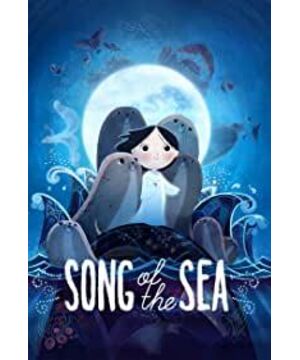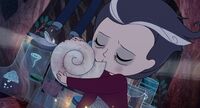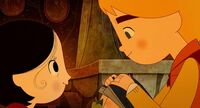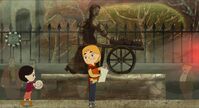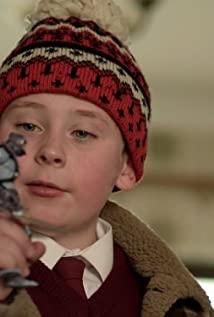Five years ago, Tom Moore's feature film debut "The Secret of Kelvin" was nominated for the Oscar for Best Animation, and it was ultimately defeated by the best cartoon of this century so far, "The Flying House". Five years later, his second feature film "Song of the Sea" is a continuation of the previous work in terms of aesthetics, value, narrative and material sources: hand-painted, Celtic mythology, Irish folk traditions, and even got Oscars. Nominate. With this year's weaker lineup, Selkie is likely to get the Goldman. High-quality cartoons can never go back to the hand-painting of the pre-computer era. For example, some character dynamics in the film are undoubtedly produced by computer technology in order to save costs. The beautiful hand-painted style is another exploration after the culmination of the technology of tracing the real world in cartoons: Pixar's lifelikeness exhausted the way of animation technology to be realistic, so the artists had to look for innovations in the unreal direction. Approach. It's like Surrealism after Naturalism, Picasso after Impressionism. The hand-painted "shape" is undoubtedly suitable for the "real" of the film. The dichotomy of "adult-child" runs through the film, enclosing a series of binary pairs of "rationality-emotion", "reality-imagination", "man-made-nature", and "city-ocean"; children’s victory is adult’s Compromise is undoubtedly a metaphor of value. From a broader perspective, there is actually a set of oppositions, namely, the modern industrial society as a legacy of colonialism and the traditional Irish/Scottish culture that is intended to be excavated by post-colonialism. Apart from being an emotional orientation, the protagonist’s family’s rejection of city life and attachment to the sea is also a political position; coupled with a tender family view, it is the omnipresent homesickness in the film. This homesickness stems from the suppressed national cultural identity, awakened in the dual background of post-colonial and globalization, so it also has a dual task: not only to dig the cultural foundation of identity, but also to let the world know. Everyone knows the existence of Celtic mythology, but let it enter the canon of popular culture, and let it participate in modern consumer culture and cultural consumption under the slogan of "the national is the world". What the film tells is actually a very boring story. The problem is that when the legend and reality are merged, the preaching intention is too obvious. The image of female characters is even more unsightly, either an ugly old woman, or an innocent, pure, perfect, natural spirit, a projection of all the good things in male fantasy. However, they are powerful but fragile, and they need men with many shortcomings but strong and loyal men to act as flower protectors. And "Maleficent" are at the opposite ends . However, it is easy to understand that the subversive significance of art parody comes from the power position of the subverted object. Therefore, a well-known Disney fairy tale can be deconstructed as much as possible, while the unknown story in a weak culture is still not known. It needs to be stated in a positive way. All the subversiveness of "Song of the Sea" comes from the sociality outside the story, which lies in unreservedly embracing the local culture and boldly bringing it to the international screen. Most myths have some obscurities, and they are waiting for generations of new artists to rewrite them over and over again. Whose culture does not have such rewriting, whoever loses. The price of this is to repeatedly use existing social moral prejudices to graft the multidimensional and ambiguous values of myths onto the contemporary values we want. In all of Hollywood’s family, affection, etc., none of the Irish directors has fallen. Is this superficial and crude re-expression of aboriginal culture really all right? When we "search for roots", we actually have a pre-defined "root", the beautiful imagination of pre-modern times constructed by modern people. Half-human and half-beast creatures and magical singing have completely different symbolic meanings for each era. We only make romantic interpretations and try to forget the rough side. What we want to "go back" is a place that doesn't exist at all; our nostalgia does not have an exact "hometown" as a backing. We only have a map hand-drawn by a child. Without the help of magic, we cannot find a way back to "home" in any case. The elves buried in the city are our only salvation. The resurgence of homesickness in the post-colonial era brings a kind of depressive pain, which can only be comforted by imagination, or the identity and cultural identity constructed by imagination. Again, is there really no problem? When we "search for roots", we actually have a pre-defined "root", the beautiful imagination of pre-modern times constructed by modern people. Half-human and half-beast creatures and magical singing have completely different symbolic meanings for each era. We only make romantic interpretations and try to forget the rough side. What we want to "go back" is a place that doesn't exist at all; our nostalgia does not have an exact "hometown" as a backing. We only have a map hand-drawn by a child. Without the help of magic, we cannot find a way back to "home" in any case. The elves buried in the city are our only salvation. The resurgence of homesickness in the post-colonial era brings a kind of depressive pain, which can only be comforted by imagination, or the identity and cultural identity constructed by imagination. Again, is there really no problem? When we "search for roots", we actually have a pre-defined "root", the beautiful imagination of pre-modern times constructed by modern people. Half-human and half-beast creatures and magical singing have completely different symbolic meanings for each era. We only make romantic interpretations and try to forget the rough side. What we want to "go back" is a place that doesn't exist at all; our nostalgia does not have an exact "hometown" as a backing. We only have a map hand-drawn by a child. Without the help of magic, we cannot find a way back to "home" in any case. The elves buried in the city are our only salvation. The resurgence of homesickness in the post-colonial era brings a kind of depressive pain, which can only be comforted by imagination, or the identity and cultural identity constructed by imagination.
View more about Song of the Sea reviews


